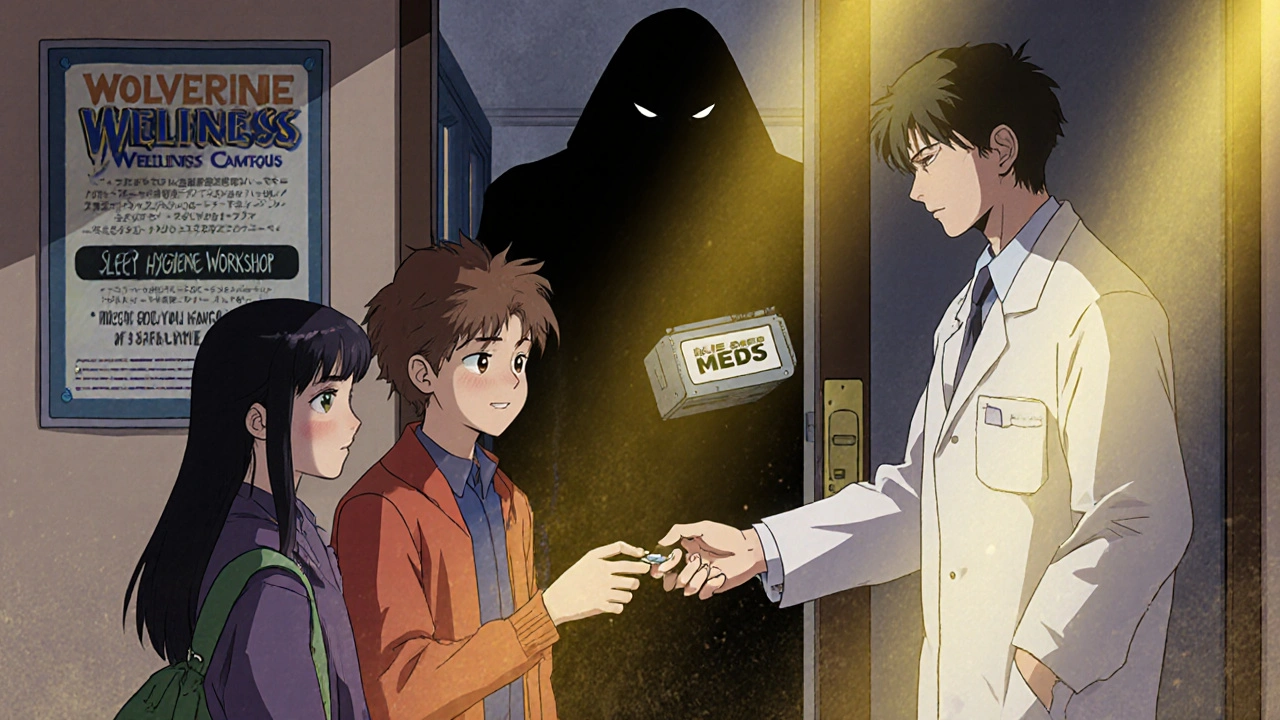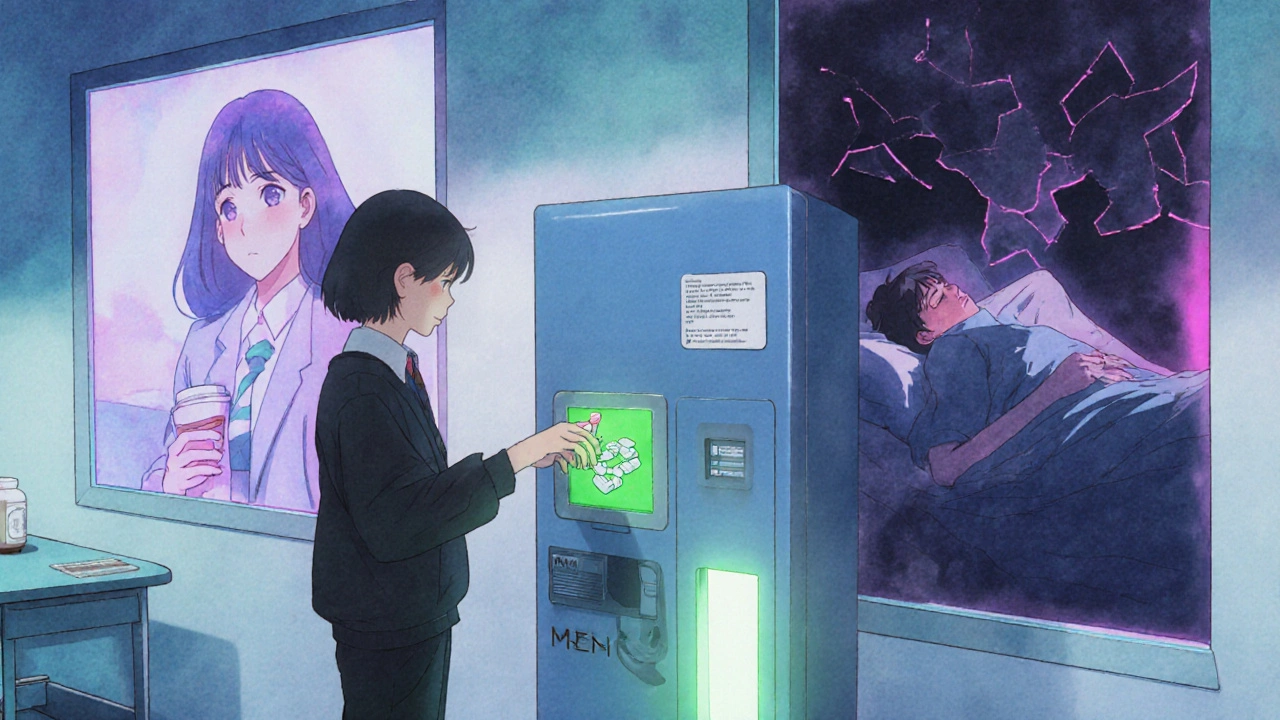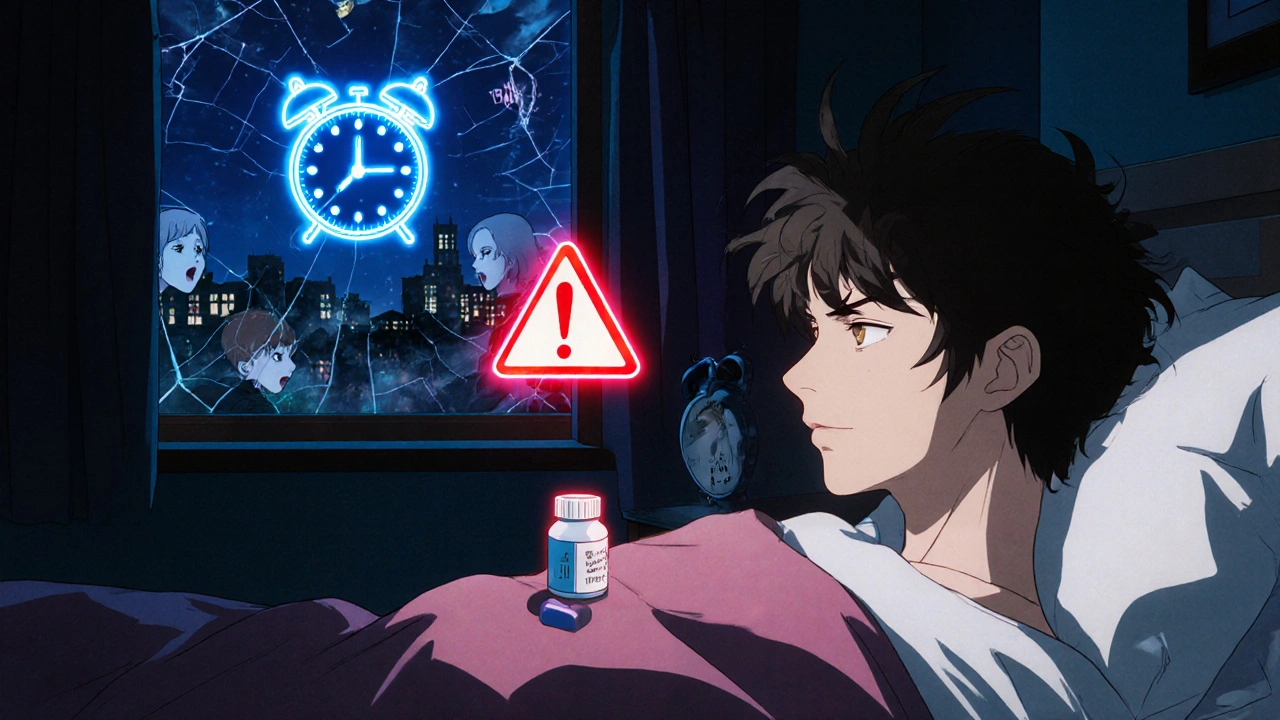Every year, thousands of college students start the semester with a prescription - for ADHD, anxiety, or pain. But not everyone takes it as directed. Some share it. Some crush it. Some take it just to stay awake before an exam. This isn’t just risky - it’s dangerous. And it’s more common than you think.
Why Prescription Drugs Are Being Misused on Campus
Stimulants like Adderall and Ritalin are the most commonly misused prescription drugs among college students. In 2023, nearly 7.2% of college students reported using them without a prescription in the past year. That’s over 1 in 14 students. Why? Academic pressure. Sleepless nights. The belief that if it’s prescribed, it’s safe.
But here’s the truth: taking someone else’s stimulant doesn’t make you smarter. It makes your heart race, your blood pressure spike, and your anxiety worse. A 2020 study from Johns Hopkins found that stimulant misuse among young adults led to a threefold increase in emergency room visits between 2005 and 2010. And it’s not just stimulants. Sedatives, painkillers, and sleeping pills are also being shared, often from friends’ medicine cabinets.
One University of Michigan student posted on Reddit: "I’ve seen Adderall passed around like candy before exams - people don’t think it’s a big deal because it’s prescription." That mindset is exactly what makes this crisis so hard to fix.
Where Are These Drugs Coming From?
Most students who misuse prescription drugs don’t buy them online or steal them from pharmacies. They get them from people they know. A 2021 study of 312 college students found that 60% of misused prescriptions came from friends, roommates, or classmates. That’s right - your roommate’s leftover Adderall might be the same one they were prescribed for ADHD last year. And they think it’s fine to lend it.
Here’s the problem: medications are not interchangeable. A dose that’s safe for someone with ADHD can be deadly for someone without it. Your body weight, metabolism, and medical history all matter. Taking a drug not prescribed to you removes all those safeguards.
And it’s not just about the drug itself. Many students don’t know how to store or dispose of their meds properly. Left in a dorm room drawer? That’s an open invitation for someone to take it. Used in a shared bathroom sink? That’s contamination. Thrown in the trash? That’s environmental risk.
What’s the Real Risk?
People think: "It’s just one pill." But one pill can be enough. In 2022, the CDC reported that 14% of high school students had misused prescription opioids - and that trend follows them into college. By the time they’re 20, many have already crossed a line they didn’t even realize they were on.
Stimulants can cause heart rhythm problems, seizures, and even sudden death in people with undiagnosed heart conditions. Opioids can lead to dependence in as few as five days. Sedatives can cause dangerous interactions with alcohol - something many students don’t realize until it’s too late.
And then there’s the mental health toll. Students who misuse stimulants often report increased anxiety, panic attacks, and insomnia - the very things they thought the drugs would fix. One student told her campus health provider: "I took it to focus. Now I can’t sleep, and I’m scared to take anything else."

What Colleges Are Doing About It
Some schools are stepping up. The University of Florida launched "Safe Meds" in 2019 - a program that gives students free lock boxes for storing medications and installs disposal kiosks in dorms and health centers. Within two years, stimulant misuse dropped by 18%.
The University of Michigan’s "Wolverine Wellness" program went further. It didn’t just talk about safe storage - it offered free academic coaching, sleep hygiene workshops, and stress management sessions. Result? A 22% drop in stimulant misuse and a 47% increase in students using academic support services.
These programs work because they don’t just say "don’t do it." They answer the real question: "What else can I do?"
More than 1,400 colleges now have dedicated medication safety coordinators - up from just 28% in 2010. And thanks to a $25 million federal grant in 2023, that number is still rising. But progress is slow. Only 29% of students can name a single place on campus to safely dispose of unused pills.
What You Can Do Right Now
You don’t need a campus program to protect yourself. Here’s what actually works:
- Keep your meds locked up. Use a small lockbox or even a locked drawer. Don’t leave them on your nightstand or in your backpack.
- Never share your prescription. Even if your friend "really needs it" - it’s illegal, and it’s dangerous.
- Dispose of unused pills properly. Most campuses now have drop boxes in health centers or pharmacies. If yours doesn’t, take them to a local pharmacy that accepts them. Never flush them or throw them in the trash.
- Know your limits. If you’re struggling with sleep, focus, or stress, talk to a counselor or doctor. There are safer, healthier ways to cope.
- Speak up. If you see someone sharing pills, say something. Not to judge - to help. "I heard that can be really risky. Want me to show you where to drop off extra meds?"

Why This Matters Beyond College
College isn’t just a place where you study - it’s where habits form. The way you handle medication now will shape how you manage health for the rest of your life. If you learn to take pills only as prescribed, store them securely, and dispose of them safely, you’re building skills that will protect you in your 30s, 40s, and beyond.
And if you’re one of the 62% of students who knows someone misusing prescription drugs - you’re not alone. But you can be part of the change. You don’t need to be a health expert. You just need to care enough to ask: "Is this really safe?"
Medication safety isn’t about fear. It’s about responsibility. And it starts with one simple choice: don’t take what isn’t yours. Don’t share what’s yours. And when in doubt - ask someone who knows.
What to Do If You’ve Already Misused Medication
If you’ve taken a prescription drug that wasn’t yours - or if you’re worried you might be developing a habit - you’re not broken. You’re not alone. And you don’t have to figure it out alone.
Most campus health centers offer confidential consultations. You can talk to a counselor about stress, sleep, or focus without fear of punishment. Many schools now offer free screenings for substance use. You don’t need to wait until it’s "bad." Early help makes all the difference.
And if you’re worried about a friend? Talk to them. Say: "I’ve noticed you’ve been taking pills before exams. I care about you. Want to grab coffee and talk?" Sometimes, just being heard is the first step to changing.

Brian Bell
November 12, 2025 AT 21:25Kevin Wagner
November 12, 2025 AT 21:56Ashley Durance
November 14, 2025 AT 07:51Ryan Anderson
November 16, 2025 AT 00:08Eleanora Keene
November 17, 2025 AT 02:47Joe Goodrow
November 18, 2025 AT 06:11Don Ablett
November 18, 2025 AT 17:15Nathan Hsu
November 20, 2025 AT 07:46gent wood
November 20, 2025 AT 19:32Dilip Patel
November 22, 2025 AT 16:14Jane Johnson
November 23, 2025 AT 10:42Peter Aultman
November 24, 2025 AT 23:39Sean Hwang
November 25, 2025 AT 01:24Barry Sanders
November 26, 2025 AT 03:32Scott Saleska
November 26, 2025 AT 03:44